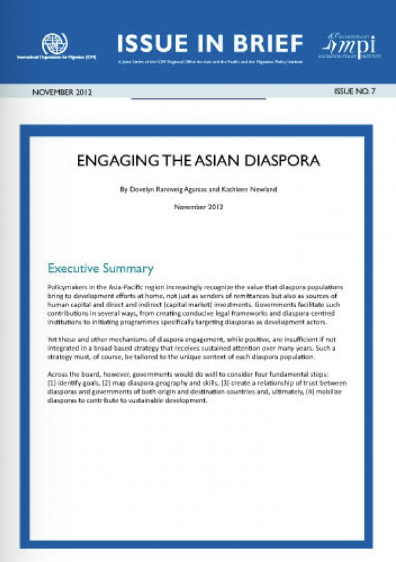
Policymakers increasingly recognize the value that diaspora populations bring to development efforts at home, not just as senders of remittances but also as sources of human capital and direct and indirect investments.
In Engaging the Asian Diaspora, Dovelyn Rannveig Agunias and Kathleen Newland explore how governments in Asia are facilitating diaspora contributions, including creation of conducive legal frameworks and diaspora-centred institutions to initiation of programmes that specifically target diasporas as development actors. The issue brief details a number of legislative proposals geared at diasporas, including flexible citizenship laws and visa arrangements, political and property rights and reduced income tax rates; it also examines the diaspora-centred institutions in government.
The authors make the case that these and other mechanisms of diaspora engagement, while beneficial, are insufficient if not integrated in a broad-based strategy that receives sustained attention over many years. Such a strategy, they note, must be tailored to the unique context of each diaspora population. The issue brief offers a helpful road map for diaspora engagement.
While such policies must be tailored to be effective, the issue brief outlines four fundamental steps that governments would do well to consider across the board:
(1) identify goals, (2) map diaspora geography and skills, (3) create a relationship of trust between diasporas and governments of both origin and destination countries and, ultimately, (4) mobilize diasporas to contribute to sustainable development.
The issue brief is the seventh in a series launched by the Migration Policy Institute (MPI) and the International Organization for Migration’s Regional Office for Asia and the Pacific offering succinct insights on migration issues affecting the Asia-Pacific region today. To read earlier briefs in the series, visit IOM Online Bookstoreand Migration Policy Institute.